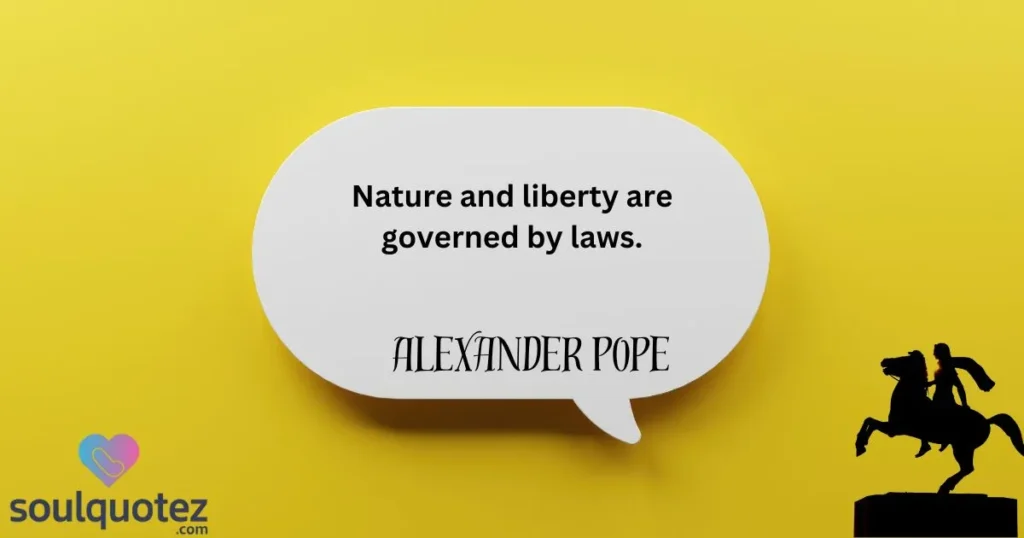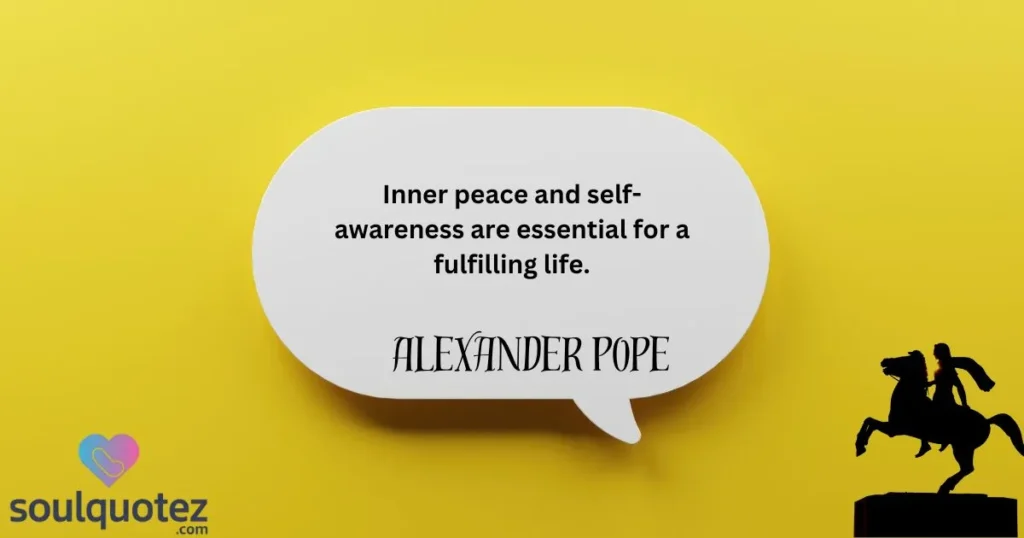“Alexander Pope’s timeless wisdom through his profound quotes on life, humanity, learning, and nature.”
Alexander Pope, one of the greatest poets of the Enlightenment era, left behind an enduring legacy of wit, insight, and reflection. His works, celebrated for their elegance and depth, offer profound observations on human nature, morality, friendship, and the beauty of the natural world. This collection highlights Pope’s most memorable quotes, showcasing his timeless relevance and wisdom.
Who is Alexander Pope?
Alexander Pope (1688–1744) was a prominent English poet of the early 18th century, best known for his sharp wit, mastery of the heroic couplet, and significant contributions to English literature during the Enlightenment. He is considered one of the greatest satirists and poets of his era. Below are some key highlights about him:
Life and Background
- Born on May 21, 1688, in London, England, to a Catholic family during a time of anti-Catholic sentiment, which limited his opportunities.
- His Catholic faith barred him from attending university or holding public office, leading to a largely self-educated literary career.
- Pope suffered from severe health problems, including a form of tuberculosis that stunted his growth and left him with a hunchback.
Major Works
- Pastoral Poetry:
- His early work, “Pastorals” (1709), established his reputation as a talented poet.
- Essay on Criticism (1711):
- A didactic poem offering advice on poetic and literary criticism. It includes the famous line:
“To err is human, to forgive, divine.”
- A didactic poem offering advice on poetic and literary criticism. It includes the famous line:
- The Rape of the Lock (1712, revised in 1714):
- A mock-heroic poem satirizing a trivial social dispute over a stolen lock of hair, considered one of the finest examples of its genre.
- Translations of Homer:
- His translations of The Iliad (1715–1720) and The Odyssey (1725–1726) were highly influential and commercially successful.
- The Dunciad (1728):
- A satirical poem criticizing the decline of literary standards and attacking his contemporaries.
- Essay on Man (1733–1734):
- A philosophical poem exploring humanity’s place in the universe, known for the line:
“Whatever is, is right.”
- A philosophical poem exploring humanity’s place in the universe, known for the line:
Themes and Style
- Satire and Criticism: Pope’s works often critiqued social and literary norms with humor and sharp wit.
- Heroic Couplets: He perfected this form, using rhymed pairs of iambic pentameter lines.
- Moral and Philosophical Depth: His later works delved into universal questions about life, society, and morality.
Legacy
- Pope was a central figure of the Augustan Age, alongside writers like Jonathan Swift and John Gay.
- His works have influenced countless writers, and his skillful use of the heroic couplet remains a benchmark in English poetry.
- Despite his physical challenges and societal restrictions, he carved out an enduring place in literary history.
Alexander Pope’s life and works continue to be celebrated for their wit, technical brilliance, and insightful commentary on human nature.
Famous Alexander Pope Quotes on Life and Humanity
1. “To err is human, to forgive, divine.”
Pope highlights that humans are naturally prone to making mistakes, while the act of forgiving is a divine quality. This quote reflects on the contrast between human imperfection and the elevated nature of compassion and forgiveness. It suggests that forgiveness is a virtue that rises above human flaws and is a reflection of a higher moral standard.
- Humans make mistakes and are imperfect.
- Forgiveness is a virtuous and divine act.
- Promotes compassion and understanding.
- Forgiveness helps build stronger relationships.
- Implies moral superiority of forgiving over holding grudges.
2. “Hope springs eternal in the human breast.”
Hope is portrayed as an enduring force within every human being, suggesting that, no matter the hardship, there is always the potential for optimism. Pope emphasizes that hope provides individuals with the strength to keep going, offering a sense of purpose even in the face of adversity. It reflects the innate human desire for improvement and success.
- Hope is an endless force within humans.
- Optimism drives humans through difficult times.
- The spirit remains resilient despite challenges.
- Hope is a motivating force for positive action.
- Reflects human nature’s tendency to look forward.
3. “Fools rush in where angels fear to tread.”
This quote contrasts the reckless nature of fools with the caution of wise individuals. It suggests that while the wise avoid unnecessary risk, fools act without thinking about the potential consequences. Pope encourages us to consider our actions carefully and to avoid impulsive decisions that may lead to undesirable outcomes.
- Fools tend to act impulsively without caution.
- Wise individuals approach situations carefully.
- Encourages thoughtful decision-making.
- Highlights the value of discretion in difficult situations.
- Warns against acting without considering potential dangers.
4. “Blessed is he who expects nothing, for he shall never be disappointed.”
Pope speaks to the benefits of managing expectations. Those who expect little from life will find satisfaction in whatever comes their way, as they are less likely to face disappointment. By lowering expectations, one can experience contentment with the present, appreciating what life offers without the weight of unmet desires.
- Lower expectations lead to greater satisfaction.
- Reduces the potential for disappointment.
- Emphasizes the value of humility and acceptance.
- Encourages a simple, peaceful outlook on life.

- Suggests happiness comes from not demanding too much.
5. “A little learning is a dangerous thing.”
Pope cautions against shallow knowledge. He argues that having only a small understanding of something can lead to overconfidence, and it is only with deeper learning that true wisdom is achieved. The quote highlights the dangers of half-knowledge and the importance of continuous learning and self-awareness.
- Shallow knowledge can lead to mistakes.
- True wisdom comes from deeper understanding.
- Overconfidence based on little knowledge can be harmful.
- Encourages humility in acquiring knowledge.
- Imparts the importance of continuous learning.
6. “Act well your part; there all the honor lies.”
This quote emphasizes the importance of playing one’s role to the best of one’s ability. Pope suggests that honor is not in seeking fame or recognition, but in fulfilling the duties and responsibilities one has, regardless of the task’s size. It calls for integrity and commitment to one’s actions, where personal satisfaction comes from doing one’s part well.
- Honor comes from fulfilling your role responsibly.
- Emphasizes integrity and commitment.
- Suggests that pride should come from effort, not accolades.
- Encourages doing your best in all situations.
- Highlights the value of personal responsibility and action.
7. “The proper study of people, is man.”
Pope argues that understanding human nature should be the focus of study and philosophy. Instead of seeking knowledge about distant or abstract subjects, he suggests that observing human behavior and understanding human motives and actions is the most meaningful study. It points to self-awareness and reflection as keys to wisdom.
- Human nature is the most important subject of study.
- Encourages self-reflection and introspection.
- Suggests understanding people leads to wisdom.
- Calls for a deeper understanding of human behavior.
- Implies that the study of , persons, leads to better self-awareness.
8. “What some call health, if purchased by perpetual anxiety about diet, isn’t much better than tedious disease.”
Pope critiques an obsession with health, suggesting that anxiety over maintaining it can be just as harmful as illness itself. He highlights the balance between living healthily and obsessing over health to the point where it leads to stress and discomfort. Pope suggests that moderation is key, and excessive worry can undermine wellbeing.
- Obsessing over health can be counterproductive.
- Worrying about diet can cause stress similar to illness.
- Advocates for a balanced approach to health.
- Reflects on the dangers of perfectionism in health.
- Calls for a healthier relationship with wellness.
9. “An honest man’s the noblest work of God.”
Pope places high value on honesty, suggesting that it is the most virtuous and noble trait a person can possess. Honesty is portrayed as a divine creation, elevating the individual who embodies it. This quote encourages integrity, suggesting that being truthful is an essential and admirable quality that transcends all other characteristics.
- Honesty is the most noble human trait.
- Encourages integrity and moral uprightness.
- Suggests that truthfulness is a divine quality.
- Reflects the importance of character in human society.
- Elevates honesty as an essential moral virtue.
10. “He who tells a lie is not sensible how great a task he undertakes, for he must invent twenty more to maintain that one.”
Pope warns about the complexity and danger of lying, suggesting that telling a lie creates an ongoing need for more lies to cover up the original deception. The quote underlines the futility and complications of dishonesty, encouraging truthfulness as the simpler and more sustainable path.
- Lying requires constant effort to maintain.
- Lies lead to more lies, complicating life.
- Truthfulness is simpler and more sustainable.
- Highlights the long-term consequences of dishonesty.
- Encourages living with integrity and openness.
11. “One truth is clear, whatever is, is right.”
This quote suggests that everything in life happens for a reason and is part of a greater plan. Pope emphasizes acceptance and faith in the natural order of things, asserting that what occurs in life is ultimately as it should be. It reflects a philosophical stance that encourages acceptance of life’s challenges and outcomes.
- Everything happens for a reason.
- Encourages acceptance of life’s circumstances.
- Reflects a belief in the greater order of things.
- Implies that life’s events are ultimately right as they are.
- Suggests faith in the universe’s plan for each person.
12. “Do good by stealth, and blush to find it fame.”
Pope suggests that true goodness is done without the need for recognition or fame. He advocates for humility and selflessness, implying that those who seek attention for their good deeds are missing the essence of what it means to do good. Genuine kindness, according to Pope, is quiet and humble.
- True goodness doesn’t seek fame or attention.
- Advocates for humility in doing good deeds.
- Suggests that selflessness is more important than recognition.
- Emphasizes the value of quiet, humble kindness.
- Reflects on the deeper purpose of performing virtuous acts.
13. “All nature is but art, unknown to thee.”
Pope expresses the idea that everything in nature is a form of art, though humans may not always recognize it as such. He suggests that the beauty of the world is a form of divine expression, and humans are often blind to its artistry. This quote invites reflection on the connection between nature and creativity, suggesting that the world is a masterpiece in itself.
- Nature is a form of art, often unrecognized.
- Suggests that the world is a divine creation.
- Encourages deeper appreciation of the natural world.
- Highlights the hidden beauty in nature’s design.
- Reflects the artistic connection between life and nature.
14. “Be not the first by whom the new are tried, nor yet the last to lay the old aside.”
Pope advises against extreme positions when it comes to change. He suggests that one should neither blindly follow new trends nor stubbornly hold onto outdated ideas. The quote calls for a balanced approach to change, encouraging adaptability and wisdom in how one approaches new and old ideas.
- Avoid extremes when embracing change.
- Encourages a balanced approach to progress.
- Suggests adapting to change while respecting the old.
- Reflects the importance of flexibility in thinking.
- Implies that moderation is key to effective decision-making.
15. “Honor and shame from no condition rise; act well your part, there all the honor lies.”
Pope underscores the idea that honor and shame are not determined by external circumstances or status but by how one performs their role in life. He stresses that personal integrity and the way we conduct ourselves are the true measures of honor. This quote calls for individuals to act with integrity, regardless of their social standing.
- Honor is determined by personal actions, not status.
- Emphasizes the importance of integrity in life.
- Suggests that personal conduct is the key to honor.
- Encourages individuals to take pride in their roles.
- Reflects on the moral value of living with virtue.
Alexander Pope on Knowledge and Learning
1. “A little learning is a dangerous thing, drink deep, or taste not the Pierian spring.”
Pope warns that acquiring superficial knowledge can lead to misguided actions and opinions. He suggests that a shallow understanding can be more harmful than ignorance because it creates the illusion of wisdom. To truly comprehend a subject, one must delve deeper, gaining profound knowledge rather than merely skimming the surface.
- Shallow knowledge can lead to misjudgment.
- Encourages deep learning for true understanding.
- Highlights the dangers of overconfidence in partial knowledge.
- Suggests that a full understanding of a subject is essential.
- Warns against dabbling in topics without serious study.
2. “The proper study of people, is man.”
Pope asserts that human nature should be the focal point of philosophical and intellectual inquiry. By studying people, its behaviors, motives, and societies, individuals can gain deeper insight into both the self and the world. This reflects Pope’s belief that self-awareness is key to wisdom and understanding.
- Understanding human nature is vital for wisdom.
- Focuses on self-reflection and human behavior.
- Encourages the study of people over abstract subjects.
- Reflects Pope’s belief in human-centered knowledge.
- Calls for introspection to achieve greater understanding.
3. “Fools admire, but men of sense approve.”
This quote contrasts shallow admiration with genuine approval based on reason and understanding. Pope suggests that those with wisdom look beyond superficial qualities and appreciate deeper value. Admiration is for the uninformed, but approval belongs to those who can assess based on judgment and insight.
- True approval comes from rational understanding.
- Fools are driven by superficial admiration.
- Encourages critical thinking and discernment.
- Suggests that true wisdom lies in deeper appreciation.
- Reflects Pope’s preference for intellect over blind praise.
4. “True ease in writing comes from art, not chance, as those move easiest who have learned to dance.”
Pope compares writing to dancing, emphasizing that mastery requires skill and practice, not luck. He suggests that the ease with which one writes is the result of careful learning and application of craft. Writing is an art form that demands technique, experience, and refinement.
- Writing requires skill and practice to be effortless.
- Mastery in writing is not due to chance, but learning.
- Likens writing to an art, requiring technique.
- Suggests that true ease comes with experience.
- Encourages discipline and study in the craft of writing.
5. “A work of art that contains theories is like an object on which the price tag has been left.”
Pope critiques works of art that try to impose theories or intellectual ideas, suggesting that it detracts from the work’s intrinsic value. Just as an object with a price tag loses its appeal, art that is overly intellectualized loses its pure emotional or aesthetic impact. He advocates for art that speaks for itself.
- Art should not be burdened with intellectual theories.
- Intellectualizing art can detract from its beauty.
- Pope values the emotional and aesthetic qualities of art.
- Critiques the over-complication of artistic expression.
- Suggests that art’s true value lies in its natural appeal.
6. “Men must be taught as if you taught them not, and things unknown proposed as things forgot.”
Pope emphasizes the need for subtlety in teaching. He suggests that the best way to teach is not to overtly instruct but to guide learners in such a way that they feel as though they’ve discovered things on their own. The quote reflects a more Socratic approach to education, where ideas are introduced gently, allowing learners to make the connections themselves.
- Effective teaching requires subtlety and indirectness.
- Suggests a Socratic method of learning.
- Encourages letting students discover ideas on their own.
- Implies that learning is more impactful when it feels self-discovered.
- Advocates for a more passive, guiding role for educators.
Wit and Satire: Alexander Pope’s Clever Commentary
1. “Blessed is he who expects nothing, for he shall never be disappointed.”
Pope conveys the idea that expectations often lead to disappointment. If one does not expect anything, they are free from the agony of unfulfilled desires. This satirical remark comments on human nature’s tendency to set high expectations, only to be let down by reality.
- Expectations often lead to disappointment.
- Suggests a life without expectations is more peaceful.
- Critiques the human tendency to desire more.
- Implies contentment comes from low expectations.
- Highlights the frustration caused by unmet desires.
2. “Fools admire, but men of sense approve.”
This quote contrasts shallow admiration with reasoned approval. Pope satirizes those who blindly praise without understanding, suggesting that true appreciation comes from thoughtful analysis and judgment. The quote reflects Pope’s disdain for unthinking praise and his preference for intellectual approval.
- Fools are driven by superficial admiration.
- True approval comes from thoughtful discernment.
- Satirizes those who admire without understanding.
- Reflects Pope’s belief in reason over blind admiration.
- Encourages a deeper, more intellectual form of appreciation.
3. “Party-spirit at best is but the madness of many for the gain of a few.”
Pope critiques the concept of party spirit or blind loyalty to political factions. He suggests that party loyalty is often irrational and serves only the interests of a select few. This satirical remark highlights the absurdity of such blind allegiance and its harmful effects on society.
- Party loyalty often benefits only a few individuals.
- Critiques the irrational nature of political factions.
- Satirizes the concept of blind loyalty for personal gain.
- Highlights the divisiveness caused by partisan politics.
- Suggests that party spirit is more madness than reason.
4. “The hungry judges soon the sentence sign, and wretches hang that jurymen may dine.”
Pope uses this quote to critique the corruption in the justice system, suggesting that judges are often motivated by their own desires and greed. In this satirical commentary, he implies that the judicial system serves the interests of those in power, rather than delivering true justice.
- Critiques corruption within the justice system.
- Suggests that judges are motivated by personal gain.
- Implies that the legal system is biased and unjust.
- Highlights the disconnect between justice and power.
- Reflects Pope’s skepticism about societal institutions.
5. “What’s fame? A fancied life in others’ breath.”
Pope satirizes the concept of fame, suggesting that it is nothing more than a fleeting perception in the minds of others. Fame, according to Pope, is an illusion—people’s opinions are constantly changing, and what is considered famous today may be forgotten tomorrow.
- Fame is an illusion created by others’ opinions.
- Reflects the transient nature of fame.
- Suggests that fame is not a true measure of worth.
- Satirizes society’s obsession with recognition.
- Implies that fame is often superficial and fleeting.
6. “At every word a reputation dies.”
Pope comments on how fragile reputation is, and how easily it can be damaged by careless words. In this witty remark, he critiques how a single slip of the tongue or a misunderstood statement can have lasting consequences, leading to the erosion of one’s reputation.
- Reputation is fragile and easily damaged.
- A single mistake can have long-lasting effects.
- Reflects Pope’s understanding of societal judgment.
- Satirizes the importance society places on reputation.
- Suggests that words hold great power in shaping perception.
7. “Some people will never learn anything, for this reason, because they understand everything too soon.”
Pope critiques those who believe they already know everything and, as a result, fail to learn. He suggests that the arrogance of thinking one has all the answers prevents true growth and learning. This remark highlights the importance of humility and openness to new ideas.
- Arrogance prevents true learning.
- Suggests that some people believe they know everything.
- Critiques the closed-mindedness that prevents growth.
- Emphasizes the need for humility in learning.
- Highlights how premature certainty can stifle curiosity.
8. “Pride, the never-failing vice of fools.”
Pope criticizes pride, calling it a vice that leads people astray. In his satirical tone, he suggests that those who are proud are blind to their own flaws and shortcomings. He emphasizes that true wisdom lies in humility, not in boastful pride.
- Pride is a vice that blinds people to their flaws.
- Critiques the arrogance of the proud.
- Suggests humility is a virtue, not pride.
- Reflects Pope’s belief in self-awareness and modesty.
- Highlights the consequences of excessive pride.
9. “Too much of a good thing is good for nothing.”
Pope warns against excess in all things, even if they are initially considered good. Overindulgence can lead to negative consequences, as balance is key. This remark emphasizes the importance of moderation in life.
- Excessive indulgence can be harmful, even in good things.
- Suggests that balance is key to a fulfilling life.
- Critiques overindulgence and the lack of moderation.
- Highlights the negative effects of excess.
- Advocates for moderation and self-restraint.
10. “Hope springs eternal in the human breast.”
Pope reflects on the enduring nature of hope, suggesting that it is a constant in the human experience. No matter how many disappointments one may face, hope continues to live on, often irrationally. This reflects Pope’s understanding of human resilience and optimism.
- Hope is a constant in the human experience.
- People continue to hope, even in the face of adversity.
- Suggests that hope can be both irrational and enduring.
- Reflects Pope’s belief in human resilience.
- Highlights the importance of hope in overcoming challenges.
11. “Be not the first by whom the new are tried, nor yet the last to lay the old aside.”
Pope advises caution in embracing new things while warning against clinging to the past. He suggests a balanced approach: avoid being overly eager to try untested ideas, but also don’t resist change when it is necessary. This quote reflects Pope’s pragmatic attitude toward progress and tradition.
- Advocates for caution in embracing the new.
- Warns against clinging to outdated practices.
- Suggests balance between innovation and tradition.
- Reflects Pope’s practical view on societal change.
- Encourages thoughtful adaptation to change.
12. “Man never thinks himself happy, but when he enjoys those things which others want or desire.”
Pope critiques human nature’s tendency to equate happiness with possessing what others covet. He suggests that people’s perceptions of happiness are often tied to external validation, rather than true contentment. This remark exposes the vanity of desiring what others value.
- True happiness often comes from personal fulfillment, not comparison.
- Critiques human nature’s obsession with others’ desires.
- Suggests that happiness is often misguided by external validation.
- Highlights the vanity of wanting what others want.
- Implies that contentment comes from within, not from others’ desires.
Alexander Pope on Friendship and Relationships
1. “Trust not yourself, but your defects to know; make use of every friend and every foe.”
Pope suggests that true self-awareness comes not from blind confidence, but from recognizing our flaws. He advises utilizing both friends and enemies as mirrors for self-improvement. This quote reflects Pope’s wisdom on humility and the importance of gaining insights from all aspects of life, whether positive or negative.
- Self-awareness comes from understanding one’s flaws.
- Encourages learning from both friends and enemies.
- Reflects Pope’s belief in the value of humility.
- Suggests that both allies and adversaries contribute to personal growth.
- Advocates for a balanced and honest view of oneself.
2. “Histories are more full of examples of the fidelity of dogs than of friends.”
In this quote, Pope highlights the often greater loyalty of dogs compared to human friends. He reflects on the fragility and inconsistency of human relationships, contrasting them with the unwavering loyalty animals, particularly dogs, demonstrate.
- Critiques the lack of true loyalty in human relationships.
- Highlights the greater fidelity of animals, like dogs.
- Reflects Pope’s disillusionment with human friendships.
- Suggests that human nature often falls short of true loyalty.
- Underlines the contrast between animal and human behavior.
3. “Who friendship with a knave hath made, is judged a partner in the trade.”
Pope cautions that associating with dishonest or immoral individuals can tarnish one’s reputation. He emphasizes the risk of being judged by the company one keeps, suggesting that guilt by association is a powerful force in social judgment.
- Warns against forming relationships with immoral people.
- Suggests that one’s reputation is shaped by the company they keep.
- Implies that dishonorable associations reflect poorly on oneself.
- Highlights the dangers of guilt by association.
- Reflects Pope’s understanding of societal judgment and social norms.
4. “At every word, a reputation dies.”
Pope observes how fragile reputation is, noting that a single careless word can destroy it. This quote speaks to the power of speech and the responsibility one holds when interacting with others, emphasizing the irreversible damage that can occur through careless remarks.
- Reputation is fragile and can be easily destroyed.
- Emphasizes the power and responsibility of words.
- Suggests that each interaction can affect one’s reputation.
- Highlights the fleeting nature of social standing.
- Reflects Pope’s focus on personal integrity and careful communication.
5. “Tis thus that on the choice of friends, our good or evil name depends.”
Pope argues that the friends we choose directly impact our reputation. The company we keep plays a crucial role in how we are perceived by others, and the character of our friends can elevate or diminish our own standing in society.
- Our reputation is closely linked to the company we keep.
- Highlights the importance of choosing friends wisely.
- Suggests that friendships can influence how others perceive us.
- Reflects Pope’s view that personal integrity is tied to the people we associate with.
- Emphasizes the role of social influence in reputation.
6. “True friendship’s laws are by this rule expressed — welcome the coming, speed the parting guest.”
Pope describes the nature of true friendship as one that welcomes and values the presence of a friend, but also understands when it is time to part. He emphasizes the balance of attachment and detachment in maintaining healthy relationships, suggesting that true friendship is not possessive or clingy.
- True friendship involves welcoming and letting go.
- Advocates for a balanced approach to relationships.
- Emphasizes the importance of respecting personal space.
- Suggests that friendship should not be overly possessive.
- Reflects Pope’s understanding of healthy emotional boundaries in relationships.
7. “The most sacred of the duties of a friend is to offer what they want.”
Pope underscores the idea that true friendship involves offering support and fulfilling the needs of the other person. It’s not just about companionship, but about understanding and meeting the desires and needs of a friend, even when it requires self-sacrifice.
- True friendship is based on offering support and meeting needs.
- Highlights the importance of understanding a friend’s desires.
- Suggests that friendship involves selflessness and sacrifice.
- Reflects Pope’s view that friendship is a mutual and giving relationship.
- Emphasizes the deeper emotional responsibilities of a friend.
Alexander Pope Quotes on Nature and Beauty
1. “Nature and nature’s laws lay hid in night; God said, Let Newton be! and all was light.”
Pope celebrates the work of Sir Isaac Newton, who uncovered the natural laws governing the universe. He attributes this scientific revelation to divine intervention, suggesting that the mysteries of nature were only revealed through reason and intellect. This quote illustrates Pope’s reverence for scientific discovery and its role in enlightenment.
- Newton’s work revealed the hidden laws of nature.
- Refers to scientific revelation as divine light.
- Celebrates the role of intellect and reason in discovering truth.
- Highlights Pope’s admiration for scientific progress.
- Reflects Pope’s belief in the transformative power of knowledge.
2. “All are but parts of one stupendous whole, whose body nature is, and God the soul.”
Pope presents nature as a grand, interconnected whole, with each part contributing to the larger design. This quote reflects his belief in the harmony of the universe and the idea that everything in nature serves a purpose, with God as the guiding force behind it all.
- Nature is an interconnected whole with a divine purpose.
- Everything in nature serves a larger, harmonious plan.
- Presents God as the soul of nature, guiding all things.
- Reflects Pope’s belief in the unity of the universe.
- Emphasizes the interconnectedness of all natural elements.
3. “First follow Nature, and your judgment frame by her just standard, which is still the same.”
Pope advises following nature’s example when making judgments, suggesting that nature provides an unchanging and reliable standard. This quote encourages aligning human decisions with the natural order, advocating for wisdom that is rooted in the consistency and purity of nature.
- Encourages aligning judgment with natural principles.
- Advocates for wisdom drawn from the natural world.
- Nature provides a consistent and reliable standard for decisions.
- Suggests that human judgment should be based on natural order.
- Reflects Pope’s belief in the timeless wisdom of nature.
4. “See, through this air, this ocean, and this earth, all matter quick, and bursting into birth.”
Pope describes the dynamic nature of life, with all matter in constant movement and transformation. This quote reflects his view of the universe as a living entity, constantly evolving and renewing itself, highlighting the perpetual energy of nature.
- Life is in constant transformation and renewal.
- Describes nature as a dynamic, evolving system.
- Reflects Pope’s view of the universe as a living, changing entity.
- Highlights the perpetual energy and movement of all matter.
- Suggests that change and birth are natural forces inherent in life.
5. “Nature, like liberty, is but restrained by the same laws which first herself ordained.”
Pope compares nature to liberty, suggesting that both are governed by their own laws. Just as freedom is constrained by laws to maintain order, nature’s laws serve to preserve balance and prevent chaos. This quote speaks to the harmonious system that underpins both natural and societal order.
- Nature and liberty are governed by laws.

- Emphasizes the balance and order in both natural and social systems.
- Suggests that laws are necessary to maintain harmony and prevent chaos.
- Reflects Pope’s belief in the importance of structure and regulation.
- Highlights the relationship between freedom and restraint in both nature and society.
6. “In all the madness of superfluous health, the trim of luxury, the glare of wealth, let this great truth be present night and day; but most be present, if we preach or pray.”
Pope critiques the excesses of luxury, health, and wealth, urging that a simple truth should always guide our lives. This quote reflects Pope’s criticism of superficial societal values and the importance of returning to fundamental truths, especially in moments of vanity or excess.
- Critiques the excesses of wealth, luxury, and health.
- Emphasizes the importance of simplicity and truth.
- Suggests that societal values often focus on superficialities.
- Calls for a return to fundamental truths in moments of vanity.
- Reflects Pope’s belief in the importance of humility and moderation.
7. “Consult the genius of the place in all; that tells the waters or to rise, or fall.”
Pope advises considering the unique characteristics of a place when making decisions, suggesting that understanding the natural elements of a location can guide actions. This quote speaks to the importance of harmony with the environment and the value of local knowledge.
- Encourages considering local conditions when making decisions.
- Suggests that understanding the environment helps guide actions.
- Reflects Pope’s belief in living in harmony with nature.
- Emphasizes the value of local knowledge and understanding.
- Advocates for respecting the natural context when making decisions.
Timeless Wisdom from Alexander Pope: Life, Humanity, and Beyond
1. Insights on Human Nature
Alexander Pope frequently explored the complexities of human nature in his works. He was deeply concerned with the foibles, virtues, and vices that define human existence. Pope’s philosophy often painted humanity as flawed yet capable of great potential, emphasizing the constant tension between reason and passion.
- Humans are marked by flaws and virtues in equal measure.
- The tension between reason and emotion defines human nature.
- Pope often used satire to expose the hypocrisies and contradictions in human behavior.
- His work encourages self-awareness and introspection.
2. The Art of Learning and Knowledge
Pope valued knowledge and intellect, especially as tools for personal growth and societal progress. He believed that knowledge was not just about accumulating facts, but about developing wisdom and judgment. Pope admired those who sought truth and questioned conventional wisdom.
- Learning is a lifelong pursuit that enriches both the individual and society.
- Knowledge should lead to wisdom, not just the accumulation of facts.
- Pope urged readers to question authority and think critically.
- Intellectual humility is vital for true wisdom.
3. Wit and Satire: A Critique of Society
Pope’s wit and mastery of satire made him one of the foremost critics of society in his time. Through his sharp, often humorous critiques, he sought to expose social hypocrisies, corruption, and vanity. His works like The Rape of the Lock and The Dunciad provide a satirical lens through which to view the moral failings of society.
- Satire is a powerful tool for societal critique and reform.
- Wit should be used to expose and challenge societal norms and injustices.
- Pope’s sharp critique often focused on the superficiality and materialism of his contemporaries.
- Humor was a way for Pope to challenge authority and societal conventions.
4. Reflections on Friendship and Relationships
Pope explored the intricacies of friendship and relationships, often reflecting on the complexities of human interactions. He saw true friendship as one that was based on mutual respect, understanding, and shared values, warning against the dangers of false friends and shallow connections.
- True friendships are based on trust and mutual respect.
- Relationships should be guided by integrity and sincerity.
- Pope warned against alliances with dishonest or unworthy individuals.
- The choice of friends significantly impacts one’s reputation and character.
5. Observations on Nature and Beauty
Pope was deeply influenced by the natural world and often used nature as a metaphor for understanding human life and the universe. He believed that beauty was not just an aesthetic experience but a divine reflection of order and harmony.
- Nature reflects divine order and beauty.
- Pope admired the simplicity and consistency of natural laws.
- Beauty and nature serve as guiding principles for human behavior.
- Harmony in nature can teach humans about balance and virtue.
6. The Role of Morality and Honor
Pope’s writings are rich with discussions of morality and honor, particularly in relation to individual and societal conduct. He believed that moral principles should guide one’s actions, and that honor, though sometimes a social construct, was integral to maintaining a righteous life.
- Morality and honor are central to a virtuous life.
- Integrity should guide every action, regardless of external pressures.
- Pope warned against compromising one’s morals for personal gain.
- True honor is derived from upholding ethical principles.
7. Commentary on Fame and Reputation
Pope frequently discussed the transient nature of fame and reputation. He viewed fame as fragile, easily tarnished by scandal or misdeeds, and emphasized the importance of cultivating a good name through virtuous behavior rather than through the pursuit of fame for its own sake.
- Fame is fragile and can be lost with a single misstep.
- Reputation should be built on integrity, not external recognition.
- Pope critiqued those who pursued fame through superficial means.
- True honor comes from maintaining a virtuous character, not from external accolades.
8. Perspectives on Pride and Humility
Pride and humility were recurring themes in Pope’s writings. He recognized pride as a common human flaw that often led to downfall, while humility was seen as a virtue that allowed individuals to grow, learn, and align themselves with higher principles.
- Pride is a dangerous vice that can lead to arrogance and downfall.
- Humility is essential for personal growth and understanding.
- Pope suggested that recognizing one’s own limitations was a form of wisdom.
- The pursuit of humility allows individuals to align with divine truth.
9. Lessons on Contentment and Happiness
Pope believed that true contentment and happiness came not from material wealth or external success, but from inner peace and self-acceptance. He argued that striving for more than one truly needs often leads to dissatisfaction and misery.
- True happiness is found in simplicity and contentment.
- Material wealth and external success are not the keys to happiness.
- Inner peace and self-awareness are essential for a fulfilling life.

- Pope encouraged finding joy in the present moment and accepting life as it is.
10. The Balance Between Tradition and Change
Pope often explored the tension between tradition and change, particularly in relation to cultural norms and values. While he valued tradition and the stability it provided, he also recognized the necessity of change for progress and growth. Pope’s writings call for a balanced approach, where tradition is respected, but innovation is also embraced when it leads to greater good.
- Tradition provides stability, but must not hinder progress.
- Change is necessary for societal growth and improvement.
- Pope’s works advocate for a balanced approach to tradition and change.
- Respect for tradition should not prevent innovation and advancement.
Key Insight
1. Who was Alexander Pope?
Alexander Pope was an 18th-century English poet known for his satirical verse, mastery of the heroic couplet, and philosophical insights.
2. What is Alexander Pope’s most famous quote?
One of Pope’s most famous quotes is “To err is human, to forgive, divine.”
3. What themes did Alexander Pope focus on in his work?
Pope explored themes such as human nature, morality, learning, friendship, wit, and the harmony of nature.
4. Why is Alexander Pope considered a significant literary figure?
Pope is celebrated for his sharp wit, literary criticism, and his ability to blend philosophical depth with poetic beauty, influencing generations of writers and thinkers.
5. What are some of Alexander Pope’s famous works?
Some of Pope’s notable works include The Rape of the Lock, Essay on Criticism, and Essay on Man.
Conclusion
Alexander Pope’s timeless quotes continue to inspire and provoke thought, offering guidance on life, humanity, and the world around us. His unparalleled wit and philosophical depth make his insights as relevant today as they were centuries ago, serving as a testament to the enduring power of great literature.

Hi! I’m Isabel, an author soulquotez.com dedicated to creating inspiring quotes and messages that add a touch of joy to any moment












